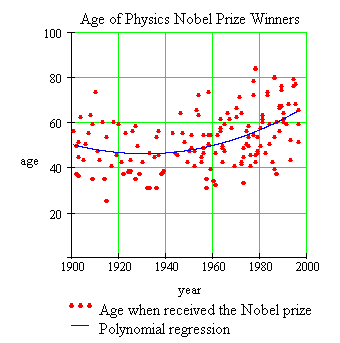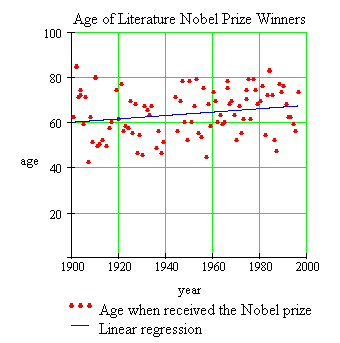
|
The Decay of or a mere statistical curiosity? |
If you would like to send us your thoughts or questions, please use the Nobel Feedback Form |
by Sceptical Scientist

In 1965 Richard Feynman, prescient as always, prophesied that science would reach its impasse. "The age in which we live is the age in which we are discovering the fundamental laws of nature, and that day will never come again." After the great truths are revealed, Feynman continued, "there will be a degeneration of ideas, just like the degeneration that great explorers feel is occurring when tourists begin moving in on a new territory."
Last night, as I was sitting in my lab while aimlessly running yet another series of buckyball experiments, it occurred to me that the age of great discoveries may indeed have long passed, and we are now in the midst of the scientific degeneration age predicted by Richard Feynman.
To test this hypothesis, I turned to StudyWorks, a new math computational tool. From the Nobel Prize Internet Archive database of Nobel Prize winners, I extracted the year when each Physics Nobel prize was awarded, and the year of birth of the recipient(s):
| Reading the dataset of Physics Nobelists: |

|
| Year the prize was awarded: |

|
| Age of the recipient when awarded the prize: |

|
For the sake of illustration, let us perform polynomial regression on this dataset, to better see the trend:
| Regression coefficient: |

|
| Regression: |

|
| Extracting the polynomial coefficients (the constant term first and the coefficient of the highest power term last): |


|
The polynomial  is
is
|

|
Now StudyWorks plots the data and the polynomial regression fit:



|
Regression coefficient
(in StudyWorks, you can vary it to produce different regression
fits):
Median age of Physics Nobel prize recipients:
|
Hmmm... The age of the Physics Nobel Prize recipients has clearly been on the sharp increase since the mid-1960s! But why?! Can it be that degeneration of scientific ideas predicted by Feynman is indeed occurring, fewer important discoveries are now made, and so the Nobel Committee must delve further and further into physics' venerable past to find physicists and discoveries worthy of the Nobel prize?
Indeed, by 1970s, the researchers have already mapped out the entire universe, from the microrealm of quarks and electrons to the macrorealm of galaxies and quasars. Physicists have shown that all matter is composed of a few elementary particles ruled by a few basic forces. Scientists have also woven their knowledge into an impressive, albeit incomplete, narrative of how we came to be. The universe exploded into existence 15 billion years ago, give or take five billion years, and is still expanding. Some 4.5 billion years ago, the detritus of a supernova condensed into our solar system. During the next few hundred million years, single-celled organisms bearing an ingenious molecule called DNA emerged on this planet. These primordial microbes gave rise, by means of natural selection, to an extraordinary array of more complex creatures, including Homo sapiens.
Everything that could be discovered has been discovered; everything that needed to be explained has been explained; there is nothing left for science to do but to slowly decay or, as Feynman would put it, "degenerate." Case closed.
Silly philosophizing aside, let us examine some of the assumptions we made in deriving this result.
First, we implicitly assumed that all prize recipients made their prize-winning discoveries when they were about the same age. On average, this is not a bad assumption. It has been shown that people are most creative in their 20s and 30s, and that's when most scientific discoveries are made. However, as science became increasingly sophisticated and incomprehensible, it now takes much more time to muster its intricacies to a sufficient degree that a novel and original contribution can be made. In other words, today's physicists have to spend more time in school before they can start advancing the cutting edge of science. This may account for at least some of the effect demonstrated here.
Also, since the Nobel prize can only be awarded to people who are still alive, the increased age of prize recipients may simply be due, in part, to the dramatic increase in life expectancy achieved over the last 100 years. In the past, the probability that the person who made the discovery would still be alive by the time it is his or her "turn" to get the prize was smaller than it is now. To (informally) test this hypothesis, let us analyze a Nobel prize dataset for some non-technical category. Unlike decaying physics, literature, carried by the human spirit, is perpetually vital. Let's look at the literature dataset then:
| Reading the dataset of Literature Nobelists: |

|
| Year the prize was awarded: |

|
| Age of the recipient when awarded the prize: |

|
Let us perform linear regression on this dataset:
| Slope: |

|
| Intercept: |

|
| Regression line: |

|
Now StudyWorks plots the data and the linear regression fit:



|
Median age of Literature
Nobel prize recipients:
|
We see that, while there is a steady increase in the age of Literature Nobel prize recipients, it displays no dramatic rise (comparable to that of Physics Nobelists) in the last few years. As noted above, this steady rise is probably due to the overall increase in life expectancy of the population.
It is also interesting to note that the median age of Literature Nobel prize recipients is a whooping 12 years higher than that of the Physics recipients. It is easy to speculate as to why this is so, but I shall restrain myself. I will conjecture, however, that, as physics gets more and more detached from reality (the infamous theory of superstrings is the prime example of this), it becomes exceedingly akin to poetry, albeit expressed in the terse language of mathematics. Based on my StudyWorks regression analysis, I predict that, by the year 2010, the deterioration of science will result in the age of Physics Nobel prize laureates being the same as that of the Literature laureates.
References: